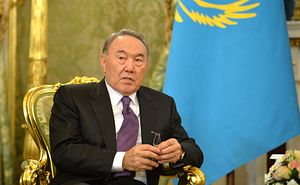For broader English-speaking audiences, stumbling across any news out of Kazakhstan is a rare event. Aside from occasional kleptocratic oddities — well-monied feuds over Manhattan property or billions of dollars disappearing in bouts of secrecy — Kazakhstan remains, 25 years after independence, something of a blank slate for Western, especially American, audiences, even within policy circles in Washington.
As such, one of the primary tools of Astana’s image-management over the past decade has been to align with American media outlets and PR teams alike to push notions of potential partnership between the United States and Kazakhstan. (No Central Asian country, over the past 25 years, has spent nearly the funds nor the effort at polishing its image for Western audiences as Kazakhstan has.) Such devices, ranging from op-eds to non-disclosed ties between reporters and governmental officials, saw a noted drop-off over the past two years, commensurate with cratering hydrocarbon prices that presumably pinched Astana’s PR budget. Indeed, over the past two years, notable distance has grown between Kazakhstan and former British Prime Minister Tony Blair, who, while in Astana’s pay, acted as the primary bridge between Kazakhstan’s leadership and Western circles.
However, the past few weeks have seen a noted uptick in English-language op-eds pushing Kazakhstan’s credentials for Western policymakers. Ranging from US News and World Report to Reuters, the pieces — some of which are the exact same as those placed elsewhere — present a discernible pattern of writings seeking to paint Kazakhstan in a flattering light as a new American administration approaches.
One such piece noted that Trump’s description of Kazakhstan’s progress under President Nursultan Nazarbayev — reportedly the word “miracle” was used — “wasn’t far off,” at least as it pertained to Kazakhstan’s economic situation. The article added that Kazakhstan “has been able to counter the rise of extremism, making it a natural partner” of the United States. Another piece’s headline noted that “Trump could find the key to fighting Islamic State” in Kazakhstan, obliquely describing the country — which it called the “nexus of Eurasia” — as one that has “long recognized the importance of managing its Islamic values.”
Much like prior pieces burnishing Kazakhstan’s image in Washington, these pieces paint Astana as a bulwark of both stability and fiscal salience: a regional partner nonpareil. However, where earlier writings could at least fall back on some kind of evidence, the recent pieces come as Kazakhstan’s most trying year in two decades comes to a close — with little sign of reprieve set to rise in 2017.
To wit, Kazakhstan’s past year saw not only the country’s worst terror attack to date, but, likewise, the country’s most substantial public protests, which subsequently resulted in the largest string of mass arrests the government has ever brought to bear. Those protesting Astana’s leadership could point to any number of reasons for their complaint, as Kazakhstan saw its 2016 growth flatline for the first time since the Great Recession, its economic model effectively reaching its exhaustion point. Moreover, with the September death of Uzbekistan’s president, Kazakhstan finally claimed the mantle of the only country whose leader has remained ensconced in power since the fall of the Soviet Union, with Nazarbayev — whose face now graces Kazakhstan’s currency — still enjoying the fruits of the recent presidential election, in which he took 98 percent of the vote.
As to the potential partnership between Astana and Washington that those recent write-ups have posited, Nazarbayev remains the only leader outside Moscow to refer to the 2014 Ukrainian revolution as a “coup.” Likewise, Kazakhstan’s foreign ministry is one of only a handful to recognize the Crimean “referendum” nominally breaking the peninsula from Ukraine. (Other states who decided to forego supporting Ukraine’s territorial integrity: North Korea, Zimbabwe, Belarus, Sudan, and Syria.) Of course, any relationship between the United States and Kazakhstan extends well beyond views on Ukraine, but proffering Kazakhstan as some form of model partner — especially throughout the post-Soviet space — is a strange push, if the last two years count for anything.
While Kazakhstan celebrates its 25th anniversary of independence on December 16, so too does it celebrate the five-year anniversary of the country’s foremost government-led massacre, at Zhanaozen. Kazakhstan, as EurasiaNet’s Joanna Lillis recently noted, has continually refused UN recommendations for an international inquiry into the events surrounding the Zhanaozen killings. None of the recent English-language op-eds praising Kazakhstan mention the massacre.
Kazakhstan, of course, has every right to burnish its image for Western audiences — and there’s no evidence any of the recent pieces pushing Kazakhstan were written by, or even encouraged by, agents working on Astana’s behalf. But with Trump’s ascension to the White House, and the commensurate retreat from American efforts to support democratization, global autocrats are already getting a four-year boost. Western writers who would paper over these autocrats’ shortcomings — and crimes — don’t need to add their efforts into the mix.

































